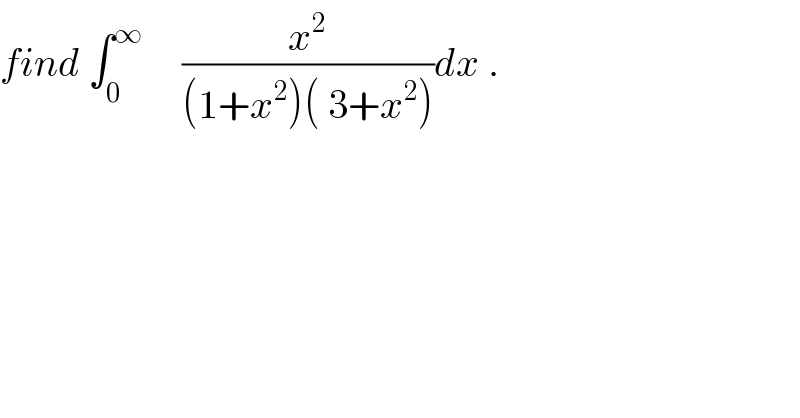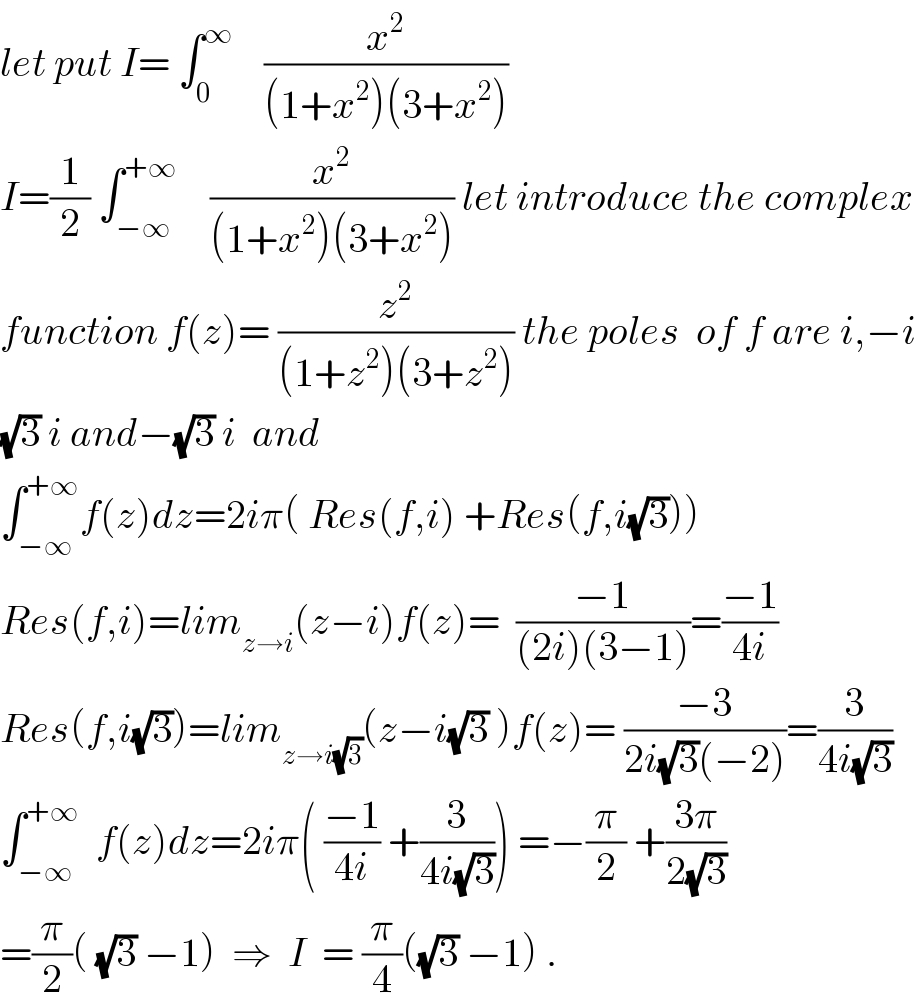
Question Number 29855 by abdo imad last updated on 13/Feb/18

$${find}\:\int_{\mathrm{0}} ^{\infty} \:\:\:\:\:\frac{{x}^{\mathrm{2}} }{\left(\mathrm{1}+{x}^{\mathrm{2}} \right)\left(\:\mathrm{3}+{x}^{\mathrm{2}} \right)}{dx}\:. \\ $$
Commented by abdo imad last updated on 13/Feb/18

$${let}\:{put}\:{I}=\:\int_{\mathrm{0}} ^{\infty} \:\:\:\:\frac{{x}^{\mathrm{2}} }{\left(\mathrm{1}+{x}^{\mathrm{2}} \right)\left(\mathrm{3}+{x}^{\mathrm{2}} \right)} \\ $$$${I}=\frac{\mathrm{1}}{\mathrm{2}}\:\int_{−\infty} ^{+\infty} \:\:\:\:\frac{{x}^{\mathrm{2}} }{\left(\mathrm{1}+{x}^{\mathrm{2}} \right)\left(\mathrm{3}+{x}^{\mathrm{2}} \right)}\:{let}\:{introduce}\:{the}\:{complex} \\ $$$${function}\:{f}\left({z}\right)=\:\frac{{z}^{\mathrm{2}} }{\left(\mathrm{1}+{z}^{\mathrm{2}} \right)\left(\mathrm{3}+{z}^{\mathrm{2}} \right)}\:{the}\:{poles}\:\:{of}\:{f}\:{are}\:{i},−{i} \\ $$$$\sqrt{\mathrm{3}}\:{i}\:{and}−\sqrt{\mathrm{3}}\:{i}\:\:{and} \\ $$$$\int_{−\infty} ^{+\infty} {f}\left({z}\right){dz}=\mathrm{2}{i}\pi\left(\:{Res}\left({f},{i}\right)\:+{Res}\left({f},{i}\sqrt{\mathrm{3}}\right)\right) \\ $$$${Res}\left({f},{i}\right)={lim}_{{z}\rightarrow{i}} \left({z}−{i}\right){f}\left({z}\right)=\:\:\frac{−\mathrm{1}}{\left(\mathrm{2}{i}\right)\left(\mathrm{3}−\mathrm{1}\right)}=\frac{−\mathrm{1}}{\mathrm{4}{i}} \\ $$$${Res}\left({f},{i}\sqrt{\mathrm{3}}\right)={lim}_{{z}\rightarrow{i}\sqrt{\mathrm{3}}} \left({z}−{i}\sqrt{\mathrm{3}}\:\right){f}\left({z}\right)=\:\frac{−\mathrm{3}}{\mathrm{2}{i}\sqrt{\mathrm{3}}\left(−\mathrm{2}\right)}=\frac{\mathrm{3}}{\mathrm{4}{i}\sqrt{\mathrm{3}}} \\ $$$$\int_{−\infty} ^{+\infty} \:\:{f}\left({z}\right){dz}=\mathrm{2}{i}\pi\left(\:\frac{−\mathrm{1}}{\mathrm{4}{i}}\:+\frac{\mathrm{3}}{\mathrm{4}{i}\sqrt{\mathrm{3}}}\right)\:=−\frac{\pi}{\mathrm{2}}\:+\frac{\mathrm{3}\pi}{\mathrm{2}\sqrt{\mathrm{3}}} \\ $$$$=\frac{\pi}{\mathrm{2}}\left(\:\sqrt{\mathrm{3}}\:−\mathrm{1}\right)\:\:\Rightarrow\:\:{I}\:\:=\:\frac{\pi}{\mathrm{4}}\left(\sqrt{\mathrm{3}}\:−\mathrm{1}\right)\:. \\ $$
Answered by ajfour last updated on 13/Feb/18

$$\:\:\:=\:−\frac{\mathrm{1}}{\mathrm{2}}\int\frac{{dx}}{\mathrm{1}+{x}^{\mathrm{2}} }\:+\frac{\mathrm{3}}{\mathrm{2}}\int\frac{{dx}}{\mathrm{3}+{x}^{\mathrm{2}} } \\ $$$$\:\:\:=\:−\frac{\mathrm{tan}^{−\mathrm{1}} {x}}{\mathrm{2}}+\frac{\sqrt{\mathrm{3}}}{\mathrm{2}}\mathrm{tan}^{−\mathrm{1}} \left(\frac{{x}}{\sqrt{\mathrm{3}}}\right)+{c}\:. \\ $$$${with}\:{limits}\:\mathrm{0}\:{to}\:\infty \\ $$$$\:\:{I}\:=\:−\frac{\pi}{\mathrm{4}}+\frac{\sqrt{\mathrm{3}}\pi}{\mathrm{4}}\:\:=\:\frac{\left(\sqrt{\mathrm{3}}−\mathrm{1}\right)\pi}{\mathrm{4}}\:. \\ $$
Commented by abdo imad last updated on 14/Feb/18

$${yes}\:{correct}\:{thanks}... \\ $$
